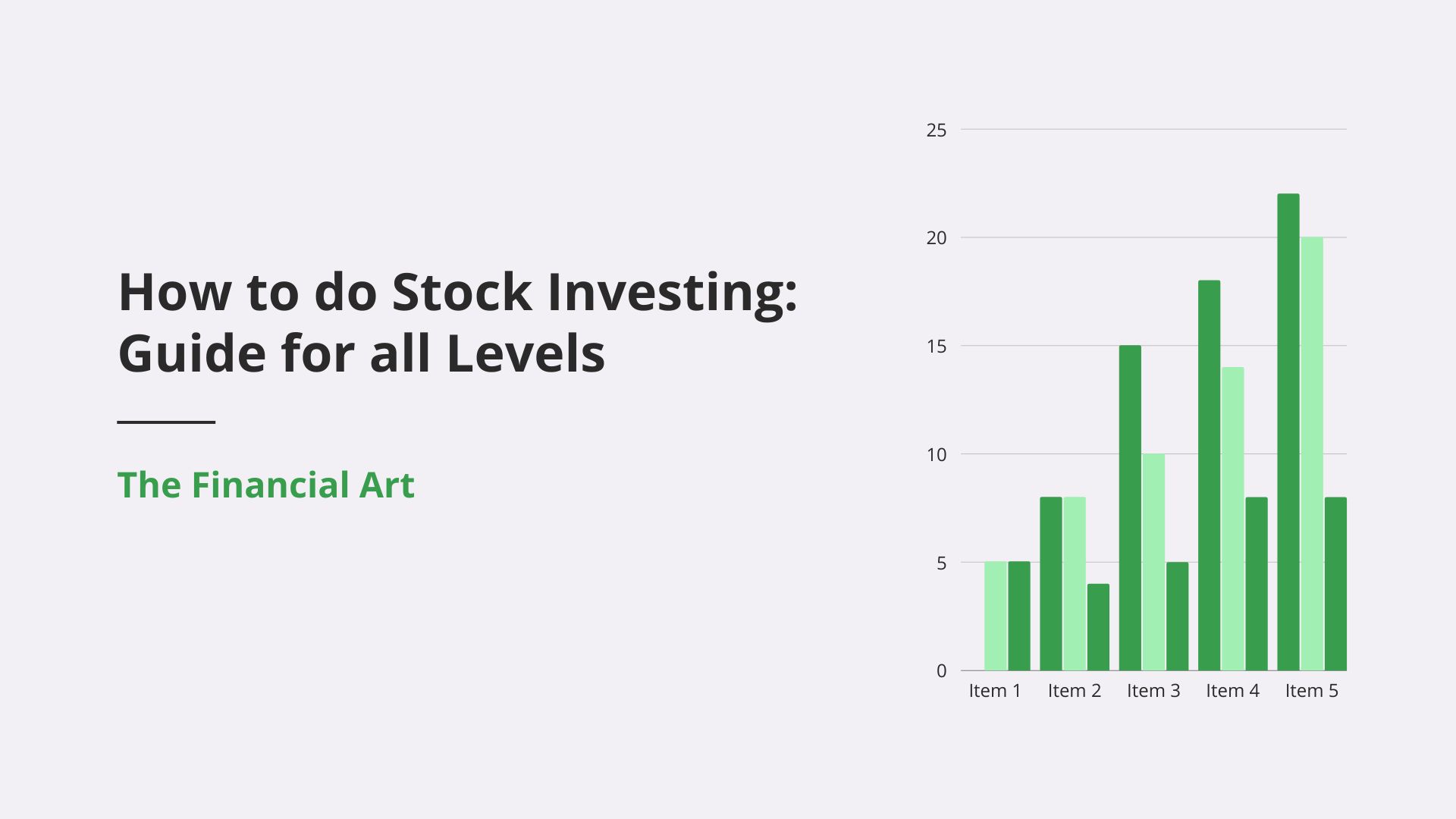Stock Investing is a great way to harness the power of growing companies to build wealth. For many newbies looking to enter the stock market, getting started can be daunting despite the long-term profit potential, but you can start buying stocks in minutes.
So how exactly is an investment in stocks done? It’s actually very easy and there are several ways to do it. One of the easiest ways is to open an online brokerage account and buy stocks and mutual funds. If you are unfamiliar with this, you can often have a professional manage your portfolio for a reasonable fee. Either way, you can invest in stocks online and start with a small amount of money.
Here’s how to invest in stocks and the basics of getting started in the stock market, even if you don’t know much about investing at the moment.
Table of Contents
- How to do stock investing?
- Opening an Investment Account
- Manage your own account
- How much you will invest in Stocks
- Pick your Favorite Stocks
- Continue Stock Investing
- Tips for Beginners in Stock Investing
- Final Wording
- Similar Articles
How to do stock investing?
Today, with multiple options when it comes to investing, you can really tailor your investment style to the knowledge and time, and energy you want to invest. You can invest as much time as you like. The first big decision point is: How is your money managed?
Following are the different ways to invest in the stock market:
Individual Stocks
You can only invest in individual stocks if you have the time and willingness to thoroughly research and evaluate stocks on an ongoing basis. It is entirely possible for a smart and patient investor to outperform the market over the long term. On the other hand, if quarterly reports and modest math don’t sound appealing, it’s perfectly fine to take a more passive approach.
Index Funds
In addition to buying individual stocks, you can also invest in index funds that track stock indices such as the S&P 500. When comparing actively managed and passively managed funds, we generally prefer the latter (although there are certainly exceptions). Index funds typically have significantly lower costs and are virtually guaranteed to match the long-term performance of the underlying index. Over time, the S&P 500 has produced a total return of around 10% on an annual basis, and such performance can build great wealth over time.
Robo-advisors
Another option that has grown in popularity in recent years is Robo-advisors. A Robo-advisor is essentially a brokerage firm that invests your money on your behalf in a portfolio of index funds that match your age, risk tolerance, and investment goals. Robo-advisors not only let you choose your investments but often optimize for tax efficiency and make changes automatically over time.
Opening an Investment Account
All advice on investing in stocks for beginners doesn’t help much if you don’t have the opportunity to actually buy stocks. To do this, you need a special account type to invest. Here are some of the options:
A Professional to manage your account
Human Financial Advisor
Human financial advisors can assist with stock portfolio design and other wealth planning activities such as when planning college expenses. Human advisors typically charge an hourly fee, or about 1% of your annual wealth, and the minimum investment is high. A good human advisor helps you stick to your financial plan.
Robo-Advisor
A Robo-advisor can design a stock portfolio that fits your time horizon and risk tolerance. They are usually cheaper than human consultants, often less than a quarter of their price. There are also many companies that offer planning services to help you maximize your wealth. The best Robo-advisors can meet most investment needs.
Manage your own account
Online brokers allow you to buy many different types of investments, including stocks, bonds, exchange-traded funds (ETFs), mutual funds, and options. Not only are the best brokers commission-free for stocks, but they also offer a lot of education and research at no extra charge so you can start playing the game right away.
If you opt for a Robo-advisor or online broker, you can open an account and start investing literally within minutes. You have to find a suitable candidate and stay on track.
How much you will invest in Stocks
First of all, let’s have a look at the money which you should not invest in stocks. The stock market is almost certain to rise in the long term, but stock prices are highly unpredictable in the short term. In fact, a 20% decline in any given year is not uncommon. In 2020, the market collapsed by over 40% of during the COVID-19 pandemic, hitting all-time highs within months.
Money not to invest in the stock market are:
- Emergency fund
- Money needed for education
- Money allocated for vacation
Now let’s talk about what you can do with investable money. You probably won’t need that money for the next five years. This concept is known as asset allocation. Several factors come into play here. Age also plays an important role, as do your specific risk appetite and investment goals.
Let’s start with your age. The general idea is that as you grow older, stocks become less desirable places to store money. When you’re young, you have decades ahead of you to weather the ups and downs of the market, but not when you’re retired and dependent on your investment income. Here are some rules of thumb: Subtract your age from 110. This is the approx. percentage of investable money that should be invested in stocks (this includes mutual funds & stock-based ETFs). The rest should be invested in other fixed-income investments such as fixed deposits, bonds, etc. You can then adjust this ratio up or down depending on your particular risk appetite.
Pick your Favorite Stocks
Important concepts to master before you begin are:
- Diversify your portfolio.
- Invest only in companies you know.
- Avoid high-volatile and high-risk stocks until you are comfortable with investing.
- Always avoid penny stocks.
Learn basic concepts & metrics for valuing stocks. Learning the diversification concept is a good idea. That means you need different types of companies in your portfolio. However, be careful of over-diversification. Stick with a company you feel confident.
Buying flashy growth stocks sounds like a great way to build your wealth (and it can be), but don’t wait until you have a little more experience. It is wise to build your portfolio on solid and well-established companies. If you are considering individual stock investing, you should know the basic valuation methods.
Continue Stock Investing
Here is one of the biggest secrets of stock investing, courtesy of Warren Buffett, Oracle of Omaha. You don’t have to do anything special to get special results. (Note: Warren Buffett is not only the most successful long-term investor of all time, but he is also one of the best sources of investment strategy wisdom).
The surest way to make money on the stock market is to buy stock in good companies at a good price and hold on to them as long as they are good (or until you need cash). That way you’ll have some volatility along the way, but over time you’ll get a good investment return.
Tips for Beginners in Stock Investing
As a new investor, keeping things simple and expanding as your skills grow is a smart decision. Luckily, investors have a great option to buy stocks from hundreds of America’s top companies in one easy-to-buy fund: the S&P500 index fund. This type of fund allows you to own some of the best companies in the world at a low cost.
The S&P 500 fund is a great option as it offers diversification and reduces risk by owning individual stocks. It’s also a solid choice for novice and intermediate investors who don’t want to spend time thinking about investing and would rather spend that time doing something else. If you’re looking to go beyond index funds and invest in individual stocks, it’s worth investing in “large-cap” companies, which are the largest and most financially stable companies. Look for companies that have a solid track record, don’t have a lot of debt, and trade at reasonable valuations (as measured by price/earnings ratios or other valuation metrics). Don’t buy overpriced stocks.
Final Wording
The great thing about stock investing these days is that there are so many options that you can invest on your own terms that you may not be sure about at first. You can choose to do this yourself or hire a professional. You can invest in stocks and equity funds, trade actively or invest passively. Whichever path you choose, choose the investment style that suits you and start building your wealth.
Similar Articles
Click on the below links to read similar articles.



